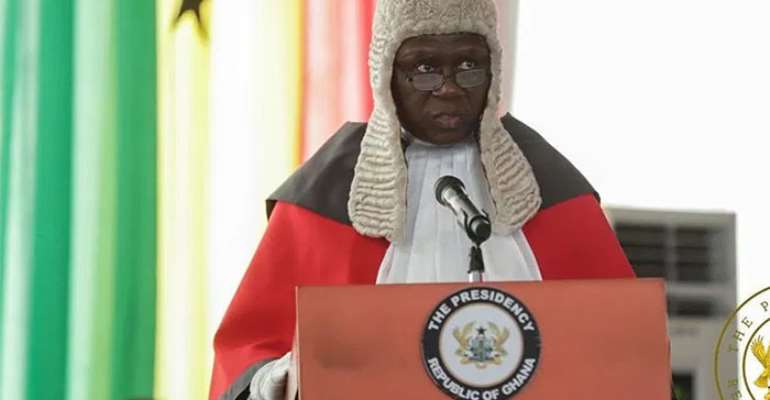Technology-driven JFAP receives international recognition
The Justice for All Programme (JFAP) is a State-led intervention, established in 2007 to alleviate prison overcrowding by setting up Mobile In-prison Special Courts to adjudicate remand/Pre-trial prisoner cases throughout the country

The Justice for all Program(JFAP) has been selected by the Paris Peace Forum(PPF) as one of 10 projects to be celebrated globally.
This is a result of the use of technology to keep the program running even amid the COVID 10 pandemic.
The JFAP was selected among over 800 projects that were considered by the PPF.
Speaking at the virtual court session of the JFAP for the Koforidua Prisons, Chairman of the National Steering Committee of the JFAP, Justice Clemence Honyenuga, said the program was initially derailed by the COVID pandemic because it made it impossible for the program to move physically into the prisons.
According to him, the virtual courts were thus introduced to keep the program running by bridging the physical distance gap that had been a challenge for the JFAP.
“We are also grateful to all the criminal justice stakeholders and the members of the National Steering Committee of the JFAP for their support and contribution in this endeavor,” he noted.
Due to the challenges posed by the COVID 19 pandemic relative to the setting up of physical courts in the nation’s prisons, virtual courts were introduced for the JFAP to continue its operations.
Under this, judges usually sit in their offices and link up with accused persons and prison defense lawyers and prosecutors via video conferencing software.
Already, the JFAP has successfully held virtual courts at Akuse and Koforidua Prisons. It is however expected to move to Sunyani, Nsawam, and the Kumasi Central Prisons respectively.
The Justice For all Program(JFAP) is organized by the Judicial Service with the POS Foundation, a civil society organization as the facilitator.
Background
The Justice for All Programme (JFAP) is a State-led intervention, established in 2007 to alleviate prison overcrowding by setting up Mobile In-prison Special Courts to adjudicate remand/Pre-trial prisoner cases throughout the country. This initiative enjoys the collective efforts of the Judicial Service of Ghana, the Office of the Attorney-General, the Ghana Prisons and Police Service, CHRAJ as well as POS Foundation (Civil Society body that serves as facilitators).
Article 14(4) of the 1992 Constitution stipulates that a person who is arrested or detained but has not received a trial within a ‘reasonable period, is entitled to unconditional release or release subject to conditions necessary for reappearance for judicial proceedings. What constitutes a reasonable time is yet to be properly determined – and it is the absence of the codification of this rule that is greatly responsible for the excessive periods in which prisoners in Ghana are held without trial.
Congestion has forced prisoners to sleep in very dehumanizing positions in prison cells. It is common for as many as fifty-five (55) inmates to share a cell intended for twelve (12). The report by the UN Special Rapporteur on Torture and Other Cruel, Inhuman or Degrading Treatment, Juan Mendez indicted Ghana on these deplorable conditions resulting from the overcrowding in our prisons which is below the United Nations Minimum Standard Rules for the Treatment of Prisoners (Nelson Mandela Rules). To heighten the issue of overcrowded prisons and lengthy pre-trial detention, sometimes detainees serve more time in detention awaiting trial than the actual sentence the crime requires.
Records from Ghana Prisons Service Criminal Records Units states that the total prisoner population at the end of December 2018 was 14,910 as against the authorized nationwide prison capacity of 9,875 with an overcrowding rate of 51%. The population comprised 13,000 convicts and 1,910 pre-trial prisoners (un-convicted persons).
The situation where Remand prisoners were held together with Convict prisoners meant that a reduction in the number of Remand inmates was a significant effort towards the reduction in the overall prison population. This necessitated this initiative “Justice For All Programme”, with collaboration from the above-mentioned institutions, directly positioned under the supervision of the office of the Chief Justice and coordinated by the National Remand Review Taskforce while being facilitated by the POS Foundation.
JFAP Impacts:
- The JFAP has helped reduce the Remand population from 4,285 (33%)out of a total prison population of 13,133 in 2007 to 2,020 representing 13.4 % of the current prison population of 15,071 as of November 2019. (see attachments for the number of beneficiaries – Discharged, Granted Bail, Convicted, Referred to the psychiatric and Applications refused)
- The JFAP received a commendation from the UN Member States at the 3rd Review Cycle of Ghana’s Human Right Record under the UN Universal Periodic Review Mechanism in November 2017, while other sisters African Countries have come to understudy the program and are replicating same in their respective countries.
- By the directive of the Current Chief Justice, the program for the first time covered the Northern sector of the country’s Prisons – Navrongo, Salaga, and Yendi prisons.
- The program under her Ladyship’s supervision and commitment by the team and DANIDA had the highest number of sittings – 11 in-prison court sittings in 2017 and 17 in 2018 as against 9 in previous years.
- The POS Foundation with support from DANIDA and with active collaboration from the National Remand Review Taskforce successfully developed and piloted the Remand Case Management and Template Software in a paperless JFA Court in 2018 during Koforidua hearings.
In conclusion, Justice Clemence Honyenuga was full of praise for the members of the National Steering Committee for providing the needed guidance and direction that has made the virtual courts a reality and also for their total support for the Justice For all Program(JFAP)
“We are also grateful to all the criminal justice stakeholders and the members of the National Steering Committee of the JFAP for their support and contribution in this endeavor,” he ended


